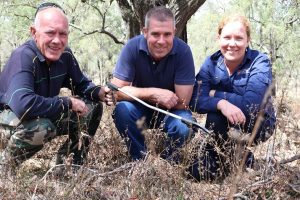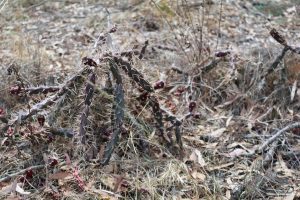
A new biological control trial will be rolled out in the Camden area this week in an attempt to tackle the invasive weed tiger pear.
Led by Greater Sydney Local Land Services with the support of Landcare volunteers at the Elizabeth Macarthur Agricultural Institute (EMAI), the trial will see the attempted establishment of a cochineal insect population to prevent further spread of the highly volatile pest species.
Greater Sydney Land Services officer Jenny Schabel said tiger pear was a cactus closely related to prickly pear, with large spines which easily break off and cause painful injury to animals and humans.
“It is a South American native believed to have been introduced in Australia as an ornamental garden plant during the early 1800s,” she said.
[social_quote duplicate=”no” align=”default”]“Tiger pear now infests large parts of Queensland and NSW, and is spreading in Western Sydney as spines from the plant easily detach and attach to passing animals, humans as well as tyres of motor vehicles.[/social_quote]
“These spines can lie on top of the ground for months before eventually taking root and establishing as a new plant,” Ms Schabel said.
The effectiveness of biological control methods via a cochineal insect had been proven in northern, warmer parts of NSW.
“If the cochineal insects survive our Sydney winters and a nursery population can be established, the biological control agent will be available to then spread into other infested areas,” Ms Schabel said.
EMAI volunteers and the team from the Plant Health Laboratory will help incubate the cochineal and monitor the release site.
Greater Sydney Local Land Services recently launched a citizen science web form on their website to record known tiger pear infestations in the region.
Landholders are encouraged to record the location of their tiger pear infestations at https://greatersydney.lls.nsw.gov.au/resource-hub/web-tools
This project is supported by Greater Sydney Local Land Services using funds from the NSW Government.

